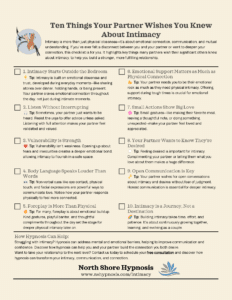
Summary
Intimacy and emotional intelligence go hand in hand: when you grow more aware of your own emotions and those of your partner, you pave the way for deeper connections, healthier communication, and more resilient bonds. By leveraging hypnosis—a powerful tool that taps into the subconscious mind—you can accelerate emotional learning, reduce unhelpful patterns, and cultivate a nourishing environment for long-lasting intimacy. Below, we explore how boosting emotional intelligence can enhance your relationships and how hypnosis can help you achieve the intimacy you’ve always desired.
Intimacy and Emotional Intelligence: Enhancing Relationship Skills with Hypnosis
Creating and sustaining intimacy in any relationship is a lifelong journey. While many of us crave deep connections, sustaining emotional closeness often requires continuous effort, communication skills, and mutual vulnerability. This is where emotional intelligence (EI) becomes pivotal. EI refers to the ability to recognize, interpret, and manage one’s own feelings—and to empathize with the emotions of others.
Yet, simply knowing we should be more empathic, communicative, or self-aware doesn’t necessarily change our ingrained habits or fears. That’s where hypnosis steps in. Hypnosis can access the subconscious mind, enabling individuals to discover and transform unhelpful beliefs and patterns that hinder emotional growth. When practiced with a client-centered approach, hypnosis fosters a supportive environment for exploring sensitive topics—like trust, vulnerability, and compassion—leading to greater intimacy in our most important relationships.
In this blog post, we’ll dive deep into what emotional intelligence entails, why it’s key to nurturing intimacy, and how hypnosis can be employed to develop these crucial relational skills.
Defining Emotional Intelligence in Relationships
Emotional Intelligence (EI) is often described using five components:
- Self-Awareness: Recognizing your own emotions in the present moment.
- Self-Regulation: Managing or adjusting your emotional reactions effectively.
- Motivation: Using emotions to direct you toward personal goals—especially in building a strong connection with your partner.
- Empathy: Understanding and sharing the feelings of your partner.
- Social Skills: Communicating effectively, resolving conflict, and being able to negotiate your wants and needs (and those of your partner) harmoniously.
When EI is optimized, couples can approach even the most challenging topics—such as sexual performance concerns, trust issues, or emotional distance—with calmness, openness, and curiosity rather than fear or anger. If you’re curious about how emotional blocks can manifest physically, you might explore our post on Understanding Anxiety: How Hypnosis Addresses Root Causes to see how psychological hurdles can spill over into everyday life.
The Link Between Emotional Intelligence and Intimacy
Emotional intelligence directly impacts intimacy for a simple reason: intimacy requires empathy, understanding, and emotional safety. If you or your partner feels insecure, unheard, or disconnected, achieving intimacy becomes an uphill battle.
- Empathy fuels emotional closeness. When partners can sense each other’s emotions, they respond in caring and considerate ways.
- Self-awareness increases accountability. Recognizing when you’re triggered allows you to take a step back and prevent conflict from escalating.
- Effective communication prevents misunderstandings. Expressing feelings clearly fosters a trusting environment.
- Self-regulation ensures that difficult conversations can happen without destructive outbursts.
By refining these EI skills, couples often notice a dramatic shift in closeness, trust, and sexual intimacy. For an in-depth look at the importance of open communication in the bedroom, read our post on Enhancing Communication in Intimate Relationships with Hypnosis.
Signs You May Need to Build Emotional Intelligence
Not sure if you and your partner need to work on EI? Some key indicators include:
- Frequent Miscommunications: You seem to argue about minor issues or misunderstand each other’s intentions.
- Bottled-Up Emotions: Either partner is afraid to express concerns, leading to eventual emotional “explosions.”
- Inability to Empathize: You find it difficult to see your partner’s point of view or frequently feel they don’t “get” you.
- Anxiety and Stress in the Relationship: Heightened stress can reduce intimacy and trigger negative cycles. If you notice tension building, our blog on Stress Effects on the Body provides insights into how stress can impact overall well-being, which in turn affects relationships.
- Lack of Vulnerability: Both partners avoid emotional exposure, playing it safe to prevent being hurt.
Addressing any of these signs often starts with self-awareness, followed by a willingness to grow. Hypnosis can be a game-changer by helping individuals unravel the subconscious roots of these issues so they can improve their relationship dynamic.
How Hypnosis Can Enhance Emotional Intelligence
Hypnosis is a therapeutic technique that allows you to slip into a state of focused relaxation. In this relaxed state, your mind becomes more open to positive suggestions, behavioral changes, and deeper self-reflection. At North Shore Hypnosis in Amesbury, MA, our client-centered approach personalizes every session, ensuring you receive precisely what you need to move forward.
Here’s how hypnosis fosters EI growth:
- Increased Self-Awareness: By calming the conscious mind, hypnosis helps you observe your emotions without judgment. For example, if you harbor shame or guilt around intimacy, sessions can gently uncover these feelings so you can address them. Our blog post on Effects of Shame and Guilt on Sex explains how deeply such emotions can hinder intimacy.
- Rewiring Limiting Beliefs: During hypnosis, you can identify self-defeating thoughts (“I’m not good enough,” “I can’t trust anyone”) and replace them with empowering beliefs.
- Strengthening Empathy: Client-centered hypnosis can encourage your subconscious mind to practice perspective-taking and compassion, key components of empathy.
- Stress and Anxiety Reduction: Emotional intelligence suffers when stress is high. Hypnosis reduces tension, placing you in a calm mental state that’s more receptive to new emotional skills. Curious about how it tackles anxiety overall? Our article on Hypnosis for Stress and Anxiety covers that in detail.
- Improved Communication: Sessions can incorporate guided imagery or affirmations that boost confidence in expressing difficult emotions.
As you develop emotional intelligence under hypnosis, you’ll find it easier to connect authentically with your partner—opening doors to more meaningful intimacy and joy.
Using Hypnosis to Identify and Shift Limiting Beliefs
In many cases, emotional intelligence is hindered by subconscious beliefs picked up from past experiences, family upbringing, or even cultural expectations. Here are a few ways hypnosis can help transform these deeper layers of consciousness:
- Uncovering Childhood Patterns: Perhaps you learned as a child that expressing emotions led to punishment or rejection. Hypnosis can help you safely revisit and heal those memories, allowing you to cultivate a new perspective.
- Combating Negative Sexual Beliefs: If you’ve ever internalized harmful ideas that intimacy or sexual expression is “bad” or “shameful,” exploring resources like our post on Ten Most Common Negative Sexual Beliefs can be enlightening, and hypnosis can help you reframe those negative beliefs.
- Addressing Fears of Vulnerability: Emotional openness can be terrifying if you fear being hurt. Hypnosis gently guides you to understand these fears at their roots and adopt coping strategies that create emotional security.
Through this process, you become more receptive to healthy relationship patterns, building trust and closeness with your partner.
Practical Strategies for Strengthening Your Relationship
Even as you pursue hypnosis to bolster emotional intelligence, there are practical steps you can take together to reinforce positive change:
Scheduled “Emotional Check-Ins”
- Dedicate a small block of time daily or weekly for genuine emotional sharing. This structured format can help you both practice open communication without feeling rushed.
Mindful Listening Exercises
- Instead of immediately responding with advice or defense, focus on truly hearing your partner. Observe body language, tone, and underlying emotions. Our article on Embracing Vulnerability: Opening Up in Relationships provides more guidance on deep, empathetic communication.
Shared Relaxation Techniques
- Perform short mindfulness sessions, breathing exercises, or bilateral stimulation. Bilateral stimulation is discussed in our post on Bilateral Stimulation for Stress and Anxiety—a technique that can calm both mind and body, fostering a more harmonious environment for emotional growth.
Positive Reinforcement
- Acknowledge each other’s emotional wins. For example, if your partner bravely shares a concern, praise them for their openness. This approach encourages both of you to keep taking emotional risks.
Explore Sensual and Sexual Exercises
- When emotional connection is strong, physical intimacy often follows more naturally. If sexual insecurities are an issue, consider reading our post on Using Hypnosis to Enhance Intimacy and Strengthen Relationships for additional insights.
By blending these strategies with hypnosis sessions, you’re giving your relationship a robust framework for growth and continuous support.
Real-Life Scenarios Where Hypnosis Supports Intimacy
To illustrate how this process works, let’s consider a few hypothetical but common scenarios:
- Scenario A: Communication Barriers
- Alex and Jamie rarely discuss deeper feelings, leading to resentments. In hypnosis, Alex discovers a subconscious fear of rejection rooted in childhood. Meanwhile, Jamie realizes a pattern of shutting down any expression of anger. By addressing these hidden triggers, they build empathy, open communication channels, and create room for healthy, productive dialogue.
- Scenario B: Fear of Commitment
- Jordan’s past relationship ended in heartbreak, and now she hesitates to fully commit to her new partner. In hypnosis sessions, Jordan uncovers that she blames herself for the previous relationship’s failure. Processing this guilt helps her release self-blame, allowing her to approach the new relationship with trust. If commitment concerns resonate with you, our post on Commitment Confident: Overcoming Fear of Commitment goes into more detail on how hypnosis can help break through these barriers.
- Scenario C: Sexual Performance Anxiety
- Sam experiences anxiety about sexual intimacy, fearing they won’t meet their partner’s expectations. Hypnosis can address the underlying insecurities, leading to improved confidence and heightened pleasure. Our blog on Using Hypnosis To Help Improve Sexual Performance Anxiety discusses techniques for releasing these fears and reclaiming fulfilling intimacy.
Common Roadblocks to Emotional Connection—and How Hypnosis Helps
Roadblocks to healthy intimacy can range from lingering unresolved conflicts to significant life stressors like job loss, health issues, or even the global pandemic. If you’ve found yourself overwhelmed by the aftermath of COVID, you’re not alone—our piece on Stress and Anxiety from the COVID Pandemic explores how collective uncertainty has heightened personal and relational stress.
Here are some typical emotional and mental barriers:
- Chronic Stress: Consistent tension depletes emotional resources. Hypnosis reduces stress, allowing clarity and warmth to return to the relationship dynamic.
- Low Self-Worth: Believing you don’t deserve love or closeness undermines intimacy. Through hypnotic affirmations, you can discover your innate value and feel worthy of love.
- Unhealed Emotional Wounds: Past betrayals or traumas often surface in current relationships. Hypnosis helps individuals process these wounds gently, freeing them from their painful hold.
- Communication Gaps: Not knowing how to express your needs or interpret your partner’s can be remedied through guided visualizations and practice in a hypnotic state.
Each of these issues can improve significantly with a combination of self-awareness, open dialogue, and subconscious re-patterning provided by hypnosis.
Integrating Hypnosis Into Your Relationship Journey
At North Shore Hypnosis in Amesbury, MA, we believe in tailored solutions. Here’s how you can integrate hypnosis into your relationship journey:
- Initial Consultation: Share your concerns and relationship goals with a certified hypnotherapist.
- Goal-Setting: Clearly define the emotional intelligence or intimacy milestones you wish to achieve.
- Personalized Hypnotic Sessions: Using imagery, affirmations, and relaxation techniques to instill empowering beliefs.
- Homework Assignments: Post-session tasks—like journaling or practicing communication exercises—to reinforce new patterns.
- Follow-Up: Evaluate improvements and explore new layers of growth, adjusting the approach as needed.
Hypnosis is a catalyst for transformation, especially when paired with ongoing emotional work in daily life.
Conclusion
Strengthening intimacy requires a holistic approach—one that includes honest self-reflection, empathic communication, and an openness to continuous growth. Emotional intelligence paves the way for genuine trust and connection, but sometimes our subconscious mind holds us back. Hypnosis offers a gentle, yet powerful, tool to unlock deeper emotional awareness, heal old wounds, and nurture the kind of closeness every relationship deserves.
If you’re ready to transform how you and your partner relate, consider exploring hypnosis. At North Shore Hypnosis in Amesbury, MA, we’re here to guide you toward richer connections and the emotional well-being you’ve been craving. Here’s to a journey of openness, empathy, and enduring intimacy!
Learn Ten Things Your Partner Wishes You Knew About Intimacy

Do you want to have better intimate relationships? Discover ten things your partner wants you to know to have more fulfilling relationships.
Click now for your free checklist, “Ten Things Your Partner Wishes You Knew About Intimacy.
Scott is a Certified Hypnotist with over ten years of experience. He is an Advanced Certified Tantra Educator through the Source School of Tantric Yoga and has extensive experience with Tantric, Taoist, and Somatic intimacy.
Click HERE to schedule a complimentary 20-minute Discover Call with Scott.

